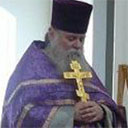The Orthodox calendar designates the first Sunday after Pentecost as the feast of “All Saints”. Every day of the year celebrates the memory of some saint of the Church; most days, in fact, are shared among several saints, and some saints, for whatever reason, merit more than one feast day. But on this particular day we commemorate all the saints of the Church.
Who are the saints? There are really three answers to that question. The first answer, the one which probably comes to mind most readily, is that the saints are those illustrious Christians of the past whom we recognize in feast days, the dedications of churches, in icons, etc. The second is that we ourselves are the saints. The third answer, and the one that draws the other two definitions together, is that we, as Orthodox Christians, are called to be saints.
The first definition of a saint is the one we probably think of first when someone mentions the word. From the earliest times we Christians have held in veneration those who stood out among us as shining examples of piety and righteousness. The first to be so venerated were, of course, the apostles, our Lord’s earliest followers, who left all to spread His teaching to the ends of the known world. When the Church fell under persecution another kind of sainthood appeared in the martyrs, men and women who gave up their lives rather than abandon their Orthodox Christian Faith and thus gained for themselves eternal life with Christ in His Kingdom. Later, when Christianity became the dominant religion of the Roman Empire and the persecutions ceased, a new group, those who followed the monastic life, came to remind their brothers and sisters in the Church of the danger of being trapped by the world’s values and thereby losing their zeal and sense of mission. In each era Orthodox Christians have also honored the most outstanding among their leaders: the bishops, priests, and deacons who have taught them how to live the Gospel by word and by example. And from the beginning there have been ordinary lay men and women who have followed the teachings of Christ with greater fervor and fuller devotion than those around them and for that have earned our recognition and veneration. There were apostles only in the earliest days, but in all the centuries since, the Church has continued to produce and to pay homage to martyrs, monks and nuns, clergy, and ordinary lay people who could truly be called saints. Even the apostles had their imitators in those who carried the Faith to the Slavs, across Siberia, into East Africa, and here to America. Our own Orthodox Church in America, though still new when measured against twenty centuries of Christian history, has produced many recognized saints. We see among them examples of all the types of saints – monastics and martyrs, clergy and laity – bound together by their common Faith and their common apostolic calling.
There is, however, a second answer to the question “Who is a saint?” We too are saints. “Saint” means simply a “holy person”, and we have that status as baptized, chrismated, communicant members of the “one, holy, catholic, and apostolic Church.” Holiness in this sense does not mean we have become pure and perfect. The original meaning of the word “holy” is “separate”. To say that we are saints, God’s holy people, is to say that we are separate, made different, from people still in and of the world. Holiness, in this sense, means that we have a mission and a purpose. In our baptism and chrismation Christ has set us apart for a special way of life and a special work, and the Holy Spirit has given us the power to fulfill that life and do that work.
This is what joins together the first two definitions of “saint”. God has given grace and new life to all His faithful people. We honor the saints because they lived that life and realized the promise inherent in that grace. Our calling as Orthodox Christians is to be like them, to fulfill the potential Christ has given us. We are already saints because we are part of the Church; we are challenged to become saints by letting Christ’s grace take root and blossom in our daily lives. To be part of Christ’s Church does not mean that we are now pure and perfect, but it does mean that the power for purity and perfection lives in us by the grace of the Holy Spirit. The saints responded to that power and it transformed them. Let us too be all of us saints, in all the meanings of the word. We must not be content to let eternal life be only a potential. We must not be satisfied to honor those others who have gave themselves whole-heartedly to the Christ’s Gospel. We must not remain passive members of Christ’s Body, the Church, but we must come alive as active tools of His grace and truth, fulfilling His will in every part of our lives. May the feast of All Saints awaken in us the desire and the resolve to do His will and His work so that we too may become “all saints.”
***


